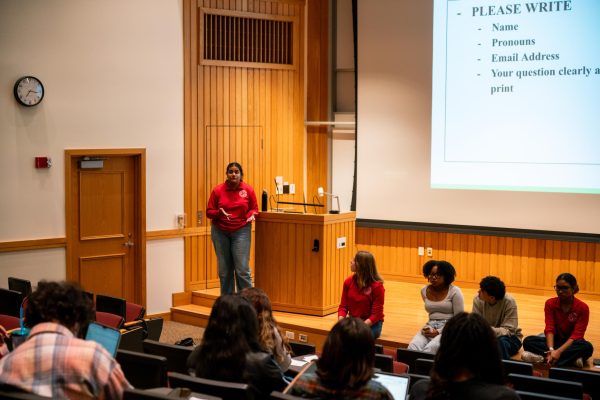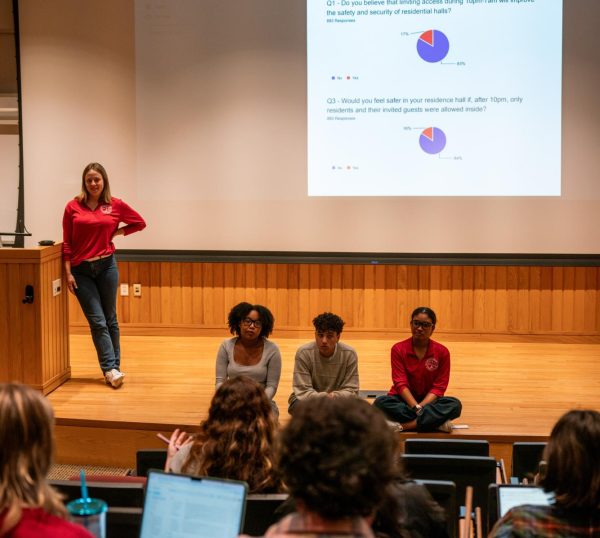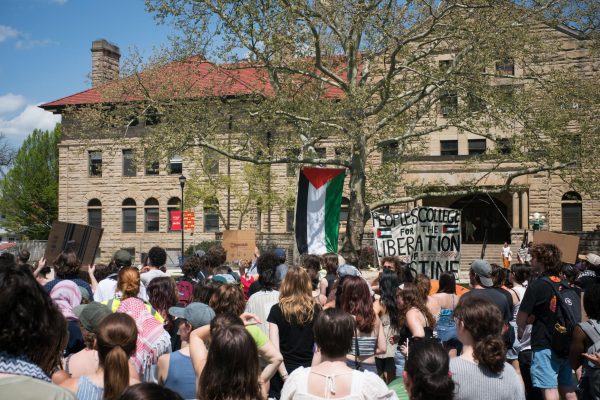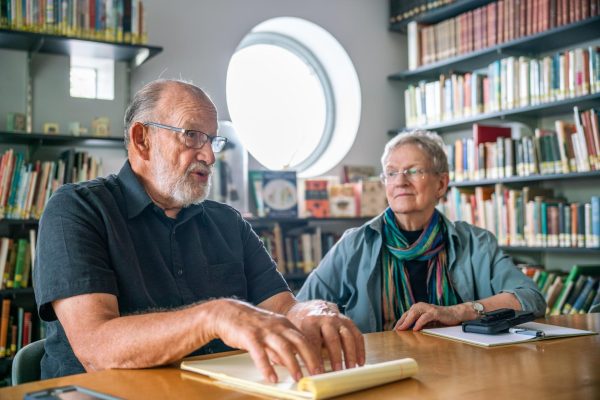All Faculty Are Recommended to Cancel Classes on Election Day
In response to Student Senate’s Oct. 16 request that the College designate Election Day a campus holiday, last Monday College and Conservatory committees both recommended that faculty cancel classes during voting hours. Student Senate is encouraging students to consider not attending classes they have on Election Day that professors choose not to cancel.
Senate called on the Conservatory’s Educational Policies Committee and the College’s Educational Plans and Policies Committee to cancel classes on Election Day because of growing concerns that voting will be more difficult than normal this year due to the pandemic. Additionally, Senate noted that many other schools, such as Stanford Law School, Brown University, and Colorado College, have canceled Election Day classes.
“Reports of long lines and crowds at early voting locations throughout Ohio raise concerns due to the risks associated with the pandemic,” Senate’s letter to the EPC and the EPPC read. “If we see similar crowds and waiting times in Oberlin, College and Conservatory students will likely have to decide whether to vote or to attend all of their classes, in addition to weighing concerns with regard to their health. … Demonstrating the College’s commitment to civic engagement, we should provide students with the flexibility to vote if they wish, rather than vote if they can.”
There are institutional barriers that made it difficult for the administration to quickly adjust the structure of the semester, according to Associate Dean of the College of the Arts and Sciences and Chair of the EPPC Laura Baudot.
“EPPC does not have the authority to make changes to the academic calendar,” Baudot wrote in an email to the Review. “That would have to go to the General Faculty, but our recommendation was designed to both make faculty aware of the significant difficulties students face while also acknowledging the importance of the course learning goals and the late date of the request.”
EPPC and EPC could have endorsed the proposal and sent it on to be approved or denied by the General Faculty. However, the General Faculty only meet once a month, and there wasn’t enough time between Senate’s request and Election Day this year for them to consider Student Senate’s proposal.
Zeb Page, associate professor and chair of Geology, as well as a member of Oberlin’s Voter Friendly Campus committee, says that while he would love to see Election Day designated a campus holiday in the future, it is equally important to maintain the College’s democratic structure through faculty governance.
“I’m a really strong proponent of faculty governance, and I think one of the tricky things about faculty governance is that it’s not fast,” Page said. “On one hand, I think canceling classes on Election Day — and perhaps even more importantly, giving staff time off on Election Day — to be able to vote is really important. On the other hand, … I don’t think EPPC has the right to cancel classes on a day — that’s my personal opinion of the way the faculty guide is set up.”
While EPPC and EPC did not fulfill Senate’s request in full, College fourth-year and Chair of Student Senate Henry Hicks appreciated the complexity of the situation.
“Obviously we were hoping for, not a recommendation, but for this to be made an official holiday, and for there to be that commitment toward making every election day a holiday moving forward,” Hicks said. “A big reason as to why they were recommendations as opposed to an official mandate is due to just how soon election day is and how long that process could have taken to go through faculty governance. … But we’re happy with the outcome that we got and we’ve been really excited about the way that faculty and administrators have approached this recommendation and saw it as an opportunity to reach out and be collaborative.”
While working with the College, Senate was able to advocate for communication about the recommendations to be sent directly to students.
“We knew that recommendations were going to go to faculty, but we wanted to make sure that students were going to be made aware of those recommendations as well, to help that discussion process between students and faculty,” Hicks explained.
On Oct. 27, President Carmen Twillie Ambar sent an email to students explaining the EPPC and EPC recommendations.
For some professors, canceling classes on such short notice can be difficult, but Page believes that voting should be among the College’s top priorities.
“I recognize the frustration of canceling a class and reducing the amount of time because that means that you have to reduce the amount of material that you cover,” Page said. “There is going to be a sacrifice that has to be made. To my mind, for voting and for engagement in the broader world, outside of Oberlin, that’s a sacrifice that I’m more than willing to make.”
According to Senior Associate Dean for Academic Affairs in the Conservatory and Chair of the EPC Peter Swendsen, OC ’99, canceling a single class can create pronounced problems for the Conservatory.
“One particular consideration in the Conservatory is that we have many activities that meet just once per week — such as lessons, coachings, studio classes, some ensemble rehearsals, and some classes,” Swendsen said. “Because of COVID-related space and scheduling limitations, rescheduling any of these activities can be very challenging, particularly at this point in the semester. Many students, as well as faculty, plan their trajectory through these activities several weeks in advance, and missing a particular day could itself be the cause of stress or interrupt academic or musical progress.”
Many professors have already canceled Election Day classes or provided options to make up or reschedule class sessions. Senate is hopeful that students who are in classes that are not being canceled will consider taking a stand this Election Day.
“We are encouraging students to consider not attending classes on election day,” Hicks said. “There are some students who feel like, because they’ve already voted, or because they are doing fine when it comes to their mental health, or they don’t feel targeted by the rhetoric that’s going around this election, they feel okay to go to class. We’re encouraging those students to think about what it means to stand in solidarity and what it means to be an ally. And to remember that one student being absent in class is a different message than 10 or 20.”
Looking forward, both committees, as well as Senate, are hoping to continue work around student voting accessibility.
“EPPC believes this recommendation can serve as a first but meaningful gesture towards future General Faculty discussions of changes to the academic calendar to reserve election days as set aside for voting and related programming,” wrote the EPPC in an email to all College faculty and instructors.





